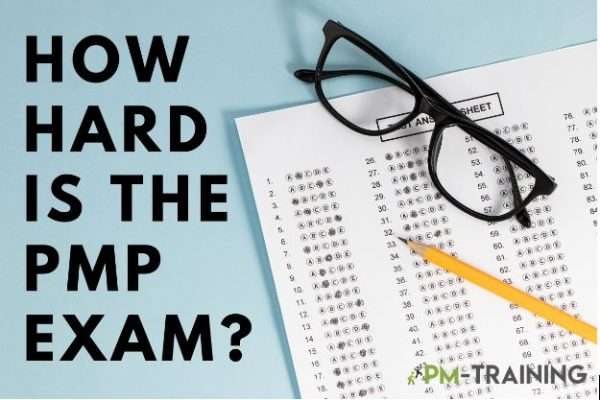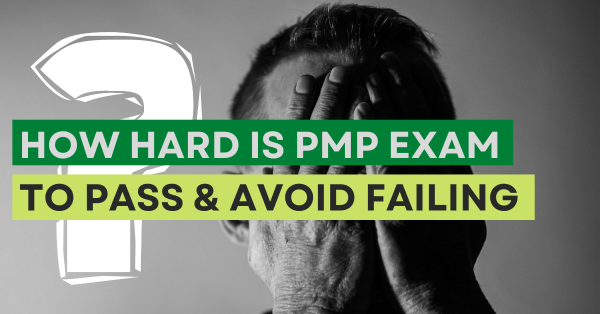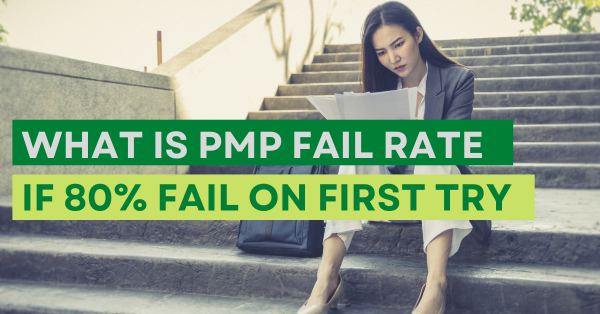The Project Management Professional (PMP) exam is more challenging than other exams so you need to understand how hard is pmp before you start studying. It means you will need to dedicate considerable time and effort to studying for the exam to be prepared to answer difficult questions about a wide range of topics. You must know how to navigate the many details of project management and have a broad understanding of all aspects involved.
Just because it’s hard doesn’t mean you can’t pass it. The journey will require a lot from you, but you will be rewarded if you do the necessary work.
This blog will give a glimpse of what to expect on the PMP exam. We will also share some valuable tips and strategies that you can use to help boost your chances of passing the exam on the first try.

What makes PMP Hard to Pass
PMP Exam Content Outline
The PMP exam is a comprehensive test of your project management skills and knowledge. It covers the three main areas of project management: people, process, and business environment. Every domain of the PMP exam has content that covers a different range of approaches related to project delivery, including predictive, agile, and hybrid.
The exam has 180 questions and you have 230 minutes to answer. It has a combination of multiple responses, multiple-choice, matching, fill-in-the-blank, and hot area. The questions are designed to be difficult to test not just your knowledge of the subject, but also your ability to understand and solve problems in real-life scenarios.
Some of the questions were situational, some theoretical, and some required calculations or graph drawings. The exam has five sections:
- Initiating the project (13%)
- Planning the project (24%)
- Executing the project (30%)
- Monitoring and controlling the project (25%)
- Closing the project (8%)
There is a lot of material to absorb in Project Management, and you will need to master the practical applications of that information. Here are some of the reasons why the PMP exam is generally tricky.
Lengthy materials in PMBOK & Study Guides
You will have to study a great deal of material to prepare for the exam, including the Project Management Body of Knowledge (PMBOK Guide). Even if the PMBOK Guide is essential to your success, the exam won’t cover all topics. You need to have a strong understanding of each domain and how they work together. All in all, it’s a lot of information.
PMP Exam structure is complex
The questions on the PMP exam are also complex and can be confusing. They have many different formats, including multiple-choice, scenario-based questions, and even simulations that require drawing diagrams or plotting data on a graph. You need to be able to think critically and quickly. Also, you need to understand all the PMP formulas.
Difficult questions + Double Negatives
Figuring out how to answer PMP questions can take time, as they are intentionally created to test your understanding of the concepts. Many of them are designed to test your decision-making ability and can be tricky at first glance.
Double negative Questions
Studying how to know what they are asking is a significant difficulty. Keep an eye out for double negative questions which are worded to trip you up.

Make the PMP Exam Easy
Study the PMBOK® Guide
The PMP exam is mainly questions from the latest version of PMBOK Guide that PMI releases. Study one knowledge area weekly by reading the guide and other supplementary material. Reviewing different sources will broaden your understanding of each topic and get exposure to different perspectives on the content. While memorization is essential, questions often test your ability to apply these ideas rather than regurgitate information verbatim.
Use study guide
One of the best ways to review for the PMP exam is by using a study guide containing all the information you need in an easy-to-understand format. A good test and study book will outline each domain, with a quick overview of the key points and some sample questions. The more they can simulate questions you might see on the exam, the better.
Take practice tests
PMP simulators are online practice exams that test your knowledge in the same format as the actual PMP exam. They replicate the exam environment so you can get comfortable with the timing and pressure. For instance, PMI has an On-demand PMP Exam Prep Course that will teach you how to apply principles and concepts in project management by using real-world scenarios from various industries.
Join study groups and discussion forums
Study with others who are preparing for the PMP exam. It will allow you to share ideas, compare notes and practice your study techniques with others. You can use online discussion forums or in-person meetings to get together regularly and discuss what you’re learning and ask questions that might arise during your studies. Participating actively in these will get your questions answered and familiarize you with a wealth of resources, saving time in preparing for the exam.

What is the fail rate of PMP?
70-80% of people fail the PMP on the first try according to pm aspire. PMI has never revealed their passing score for the PMP exam officially. No official document or notification from PMI mentions the passing score or pass rate % of the PMP exam.
If you fail the PMP exam, all is not lost. You can retake the exam up to 3 times within one year from your application approval date. Suppose you fail the examination three times within the one-year eligibility period, you must wait one year from the last test you took to reapply for the credential.
In the meantime, continue to build your experience and grow your knowledge so that you will be better prepared to pass the exam on your next attempt. Don’t let a setback deter you from achieving your goal of becoming a certified Project Management Professional.
Conclusion
The PMP exam is designed to test your ability to apply project management principles to real-world situations. The best way to prepare for the exam is by covering as many topics in the study materials, experience working on real projects, and brushing up on your project management theory.
With proper preparation, the journey to the PMP certificate is less overwhelming and you will take the PMP exam with confidence.
